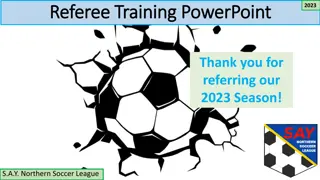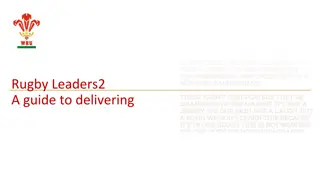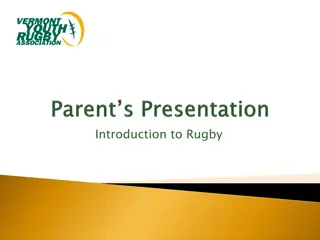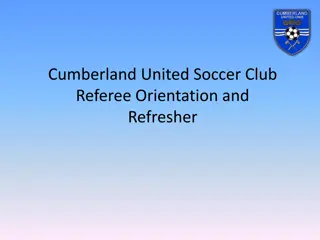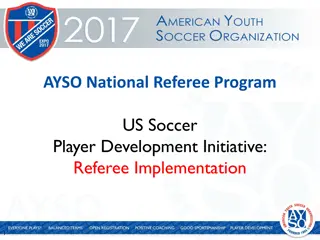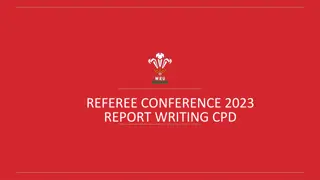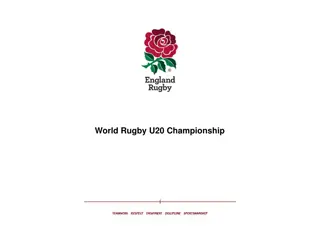The Effects of Referee and Player Frustration on Rugby Performance
Impact of frustration on rugby performance based on sports psychology research. Discusses the role of referee control, player reactions to frustration, and ways to manage anxiety levels for optimal performance.
Download Presentation

Please find below an Image/Link to download the presentation.
The content on the website is provided AS IS for your information and personal use only. It may not be sold, licensed, or shared on other websites without obtaining consent from the author.If you encounter any issues during the download, it is possible that the publisher has removed the file from their server.
You are allowed to download the files provided on this website for personal or commercial use, subject to the condition that they are used lawfully. All files are the property of their respective owners.
The content on the website is provided AS IS for your information and personal use only. It may not be sold, licensed, or shared on other websites without obtaining consent from the author.
E N D
Presentation Transcript
THE EFFECTS OF REFEREE AND PLAYER FRUSTRATION ON A GAME OF RUGBY Area of anxiety and arousal http://www.rugbyaustralia.com.au/Portals/18/Files/Refereeing/level3paper s/M.Goddard_Lvl_3_Maj_Proj_98.pdf
REASONING The research conducted by sport psychologists in the area of anxiety and arousal level fluctuations, indicate that frustration experienced will cause a psychological response (anxiety) which in turn causes a physiological response (arousal). The studies also indicate that a player s performance will diminish if his/her anxiety and arousal levels are allowed to fluctuate unnecessarily during competition
WHAT IS CONTROL? Paul akon (1976 pp44) in play the whistle describes it as the referee s ability through his management of the game to influence the players in such a way that he is able to keep the game from getting unruly and restrain the incidence of foul play and misconduct
RATIONALE OF THIS STUDY The underlying rationale that drives the basic premise of this study is to promote areas of the game that will lift its profile, such as: (i) ensuring that the game is openly displaying the skills and abilities of the athletes, (ii) that as many aspects of the game as possible are contestable situations and (iii) that the athletes play the game in a spirit that has come to be synonymous with the game RU. Likewise areas that are a blight on the game need to obliterated or managed and contained to acceptable levels. These situations include foul play, professional fouls and most importantly games that are drab and boring to watch.
WHAT IS FRUSTRATION? The term frustration has been chosen as it denotes the emotions that arise when either the unexpected or unforeseen occurs, or when a scenario occurs that is perceived as uncontrollable. Unforeseen and unexpected scenarios that arise during competition can lead to less than desirable circumstances, especially when one considers the physical and emotional nature of a game of RU. Both expected factors in a game and unexpected factors in a game that cause emotional responses are commonly referred to as factors that increase stress ( stressors ), or anxiety. That is, the emotional response experienced is referred to as anxiety.
FRUSTRATION Analysis of research conducted in the area of sport psychology around the world and the relevant findings of these studies shows that performance is hampered by feelings of frustration on the part of referees, athletes and coaches in a competition environment. It is interesting to note that a study conducted in the United States indicate that officials consistently report frustration, abuse and being unappreciated as common concerns in there chosen pursuits.
FURTHER DEFINITION OF FRUSTRATION Spielberger (1972) best defines the emotion felt under frustrating circumstances as state anxiety . Psychologists that followed Spielberger further defined state anxiety to be: conscious feelings of apprehension and tension due mainly to the individuals perception of the present or upcoming scenario as threatening. From this point it would be more appropriate replace the term frustration with anxiety . State anxiety - arises when the person makes a mental assessment of some type of threat. When the object or situation that is perceived as threatening goes away, the person no longer experiences anxiety. Trait anxiety - describes a personality characteristic rather than a temporary feeling.
ANXIETY AND AROUSAL A mistake commonly made is that anxiety and arousal are one and the same, however, M. Anshell (SPORT PSYCHOLOGY: from theory to practice, 1994) asserts that reaching and maintaining the proper emotional state that will allow athletes to perform to their potential, is to regulate two separate emotions that both play primary roles in performance - anxiety and arousal. A simple difference between the two emotions suggested by Ansell is to consider anxiety as being psychological and arousal as being physiological.
ANXIETY anxiety is the unpleasant emotional reaction when the autonomic nervous system (ie uncontrolled physiological responses such as heavy breathing, sweating and increase in heart rate) is aroused. Consequently, anxiety can be considered the emotional impact or cognitive dimension of arousal ie, arousal is essentially a physiological response and anxiety is a cognitive process. There is for each referee and athlete a level of arousal that will enable maximum potential performance to occur.
AROUSAL If an athlete while performing in competition is maintaining a level of arousal that is enabling satisfactory performance and the athlete is effected by circumstances that increase or decrease anxiety levels. Given the link between anxiety and arousal one can only conclude that the circumstances will be detrimental to both the psychological and the physiological and hence athletic performance will deteriorate. Baumeister (1984) has documented the classic example of the arousal/anxiety relation to performance in his work on the choking phenomenon . Baumeister defines the choking phenomenon as extreme state anxiety. Factors that can lead to choking are highly stressful situations, loss of self control, expectations of failure, crowd pressure, the fear of a coach s standards not being reached and peer pressure.
PERFORMING IN COMPETITION It is clear that a referee or athlete who is performing in competition with a satisfactory level of arousal may if confronted with frustration, (a factor that will lead to anxiety) create a change in arousal levels whereby the athlete will suffer from a decline in performance. As a result it is important to identify factors that will lead to frustration for both the referee and the athlete and to try and minimise the associated decline in performance so as to maintain a high quality game of RU
E.GS OF SITUATIONS THAT LEAD TO FRUSTRATION (ANXIETY) IN REFEREES i) Scrum collapses - some games suffer from incident after incident of scrum collapses. This can be a great source of frustration and embarrassment for the referee particularly when he has exhausted his arsenal in dealing with collapsed scrums. Without examining the routines that referees follow with difficult scrums - when the referee is at his wits end his anxiety levels no doubt rise to levels that do not allow optimal performance. This is an example of perceived uncontrollable circumstance.
E.GS OF SITUATIONS THAT LEAD TO FRUSTRATION (ANXIETY) IN REFEREES ii) Difficult Captains - an unforseen circumstance is where captains refuse to play their role in the management of a game and the referee is in conflict with one or both captains. This can lead to anxiety levels increasing in a referee if he becomes agitated or alternatively the referee may simply give up and his arousal levels may simply drop to unacceptably low levels.
E.GS OF SITUATIONS THAT LEAD TO FRUSTRATION (ANXIETY) IN REFEREES iii) Parameter abuse - when players fail to heed the warning and parameters that a referee sets for a game, the referee may feel frustrated given that he has fulfilled his role by setting standards and players have refused to play their role in adhering to the standards set by the referee. This can occur by way of repeated infringements at the tackle, repeated infringement by way of professional foul or repeated foul play.
RESULT OF A FRUSTRATED REFEREE Once the referee experiences frustrating circumstances this can lead to anxiety (physiological response) and then to a change in arousal levels (psychological response), which in turn can distract the referee from his task to such an extent that players no longer feel comfortable with him in control of their game. The main concern that changing arousal levels has on the referee is inhibiting the decision making process. This is particularly important as in the modern game the referee is required to make his decisions more instantly and precisely to keep the game flowing the Australian way .
THE DECISION MAKING PROCESS The information received (inputs) undergoes a process of identification, analysis and diagnosis against past experience before being passed to the central nervous system where it is turned into an action (output). Any arousal experienced effects the body physiologically by cluttering up the central nervous system. Consequently if a referee experiences arousal changes at the same time as he is trying to process input to make a decision, his central nervous system is trying to cope with two things at once the result being that a decision comes too late or is in fact processed incorrectly and the decision is wrong.
STRATEGIES TO DEAL WITH ANXIETY/FRUSTRATION anxiety and arousal are inherent in competitive sport and that the responsibility of controlling an athlete s emotion rests with the individual himself/herself. (Ansell in his book Sport Psychology from theory to practice) i) focus on what you can control - anxiety lies in the fear of the unknown, therefore to reduce unnecessary an athlete should not concern himself/herself with he/she can control.
STRATEGIES TO DEAL WITH ANXIETY/FRUSTRATION ii) think practice - an athletes anxiety is usually caused by perceived threatening scenarios. However when an athlete practices there are no perceived threatening scenarios so the athlete can perform his tasks with little or no anxiety. Anshell suggests that in competition an athlete should think practice and therefore envisage him/herself performing the tasks in a non-threatening environment and by doing so removing anxiety from the competition environment.
STRATEGIES TO DEAL WITH ANXIETY/FRUSTRATION iii) keep active - researchers, most notably William Morgan from the University of Wisconsin, have shown that engaging in physical activity reduces anxiety by providing a physical outlet for heightened anxiety. This relaxing effect is one reason for the pregame warm up and it is suggested that the pregame warm should be used by referees for active psychological warm up as well as physical. This can be achieved by using this time to turning ones attention to the task at hand.
STRATEGIES TO DEAL WITH ANXIETY/FRUSTRATION iv) cognitive strategies - there are numerous cognitive strategies for reducing anxiety offered by the sport psychologists, these include: - mental imagery, - relaxation techniques, -positive self talk, - the use in competition of cues.
CONCLUSION Players and coaches treat you as a referee the moment you enter the football clubs grounds, regardless of what you are wearing or even if you are ACTUALLY refereeing their match or that day. Why is this important? - A referee begins his role as a referee LONG before a match begins!
CONCLUSION General rules for dealing with players, coaches and spectators: Have your head right, expect criticism and plan for it don t be too tough, steer clear of provocation and antagonism Don t bark be firm and relaxed, it shows that you are relaxed and in control Show confidence, command respect via your appearance, manner and voice Forget the spectators! They like to antagonise players and referees, ignore them Answer reasonable questions with courtesy Chose words wisely and carefully, don t threaten Stay cool, establish a calm environment (Greg Sargent sports psychology Coach at the AIS, 1994)
CONCLUSION Some keys to remember are: Communication This skill is vital to your/our success. It is important to convey to the players that you are CLAM, IN CONTROL, and CONFIDENT, While at the same time being POSITIVE and FAIR. The non-verbal aspect of communication can be even more important. Not only what you say but how you say it and the way you treat other people in delivering the message Non verbal communication involves: Body motion (gestures, facial expressions) Physical characteristics (physical appearance, build) Voice characteristics (inflections change in pitch/tone/resonance) Body positions (distance between bodies, angle to each other) Characteristics of effective communication include honesty, clarity, consistency and sincerity. BE POSITIVE


